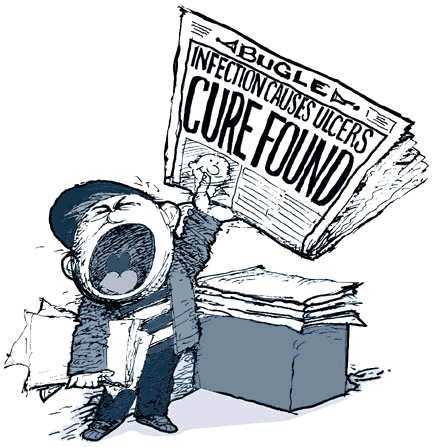Home > Good News - A Cure For Ulcers!!!
- This site is for archive purposes only -
Helicobacter pylori and Peptic Ulcer Disease
 Good News - A Cure For Ulcers!!
Good News - A Cure For Ulcers!!
Whether you think you might have an ulcer, have recently been diagnosed with one, or have been living with ulcers for many years, this brochure brings good news. Recently, scientists have found that most ulcers are caused by an infection. With appropriate antibiotic treatment, your ulcer - and the pain it causes - can be gone forever!
What is an ulcer?
Twenty-five million Americans suffer from ulcers. An ulcer is a sore or hole in the lining of the stomach or duodenum (the first part of the small intestine). People of any age can get an ulcer and women are affected just as often as men.
What causes ulcers?
Helicobacter pylori (H. pylori) is a bacterium that lives on the lining of the stomach. Although we used to think that spicy food, acid, and stress were the major causes of ulcers, we now know that nine out of ten ulcers are caused by H. pylori. Medicines that reduce stomach acid may make you feel better, but your ulcer may come back. Here's the good news: Since most ulcers are caused by this bacterial infection, they can be cured with the right antibiotics.
 What are the symptoms of an ulcer?
What are the symptoms of an ulcer?
The most common ulcer symptom is gnawing or burning pain in the abdomen between the breastbone and the belly button. The pain often occurs when the stomach is empty, between meals and in the early morning hours, but it can occur at any other time. It may last from minutes to hours and may be relieved by eating food or taking antacids. Less common symptoms include nausea, vomiting, or loss of appetite. Sometimes ulcers bleed. If bleeding continues for a long time, it may lead to anemia with weakness and fatigue. If bleeding is heavy, blood may appear in vomit or bowel movements, which may appear dark red or black.
How can your health care provider tell if you have H. pylori?
Your health care provider may choose to use any of the following tests to determine if your ulcer is caused by H. pylori.
- Blood tests: A blood test can confirm if you have H. pylori. To perform this test, your health care provider sends your blood sample to a lab.
- Breath tests: A breath test can determine if you are infected with H. pylori. In this test, you drink a harmless liquid and in less than 1 hour, a sample of your breath is tested for H. pylori.
- Endoscopy: Your health care provider may decide to perform an endoscopy. This is a test in which a small tube with a camera inside is inserted through the mouth and into the stomach to look for ulcers. During the endoscopy, small samples of the stomach lining can be obtained and tested for H. pylori.
What is the treatment for H. pylori infection?
If you have an ulcer, you should be tested for H. pylori, and if found to be infected, you should be treated with antibiotics. Antibiotics are the new cure for ulcers; therapy is 1-2 weeks of one or two antibiotics and a medicine that will reduce the acid in the stomach. This treatment is a dramatic medical advance because eliminating H. pylori with antibiotics means that there is a greater than 90% chance that the ulcer can be cured for good. Remember, it is very important to continue taking all of this medicine until it is gone, even when you begin to feel better. If you are having side effects that make it hard to take your medicine, talk to your health care provider.
Ulcer Facts
- Most ulcers are caused by an infection, not spicy food, acid or stress.
- The most common ulcer symptom is burning pain in the stomach.
- Your doctor can test you for H. pylori infection.
- Antibiotics are the new cure for ulcers.
- Eliminating H. pylori infections with antibiotics means that your ulcer can be cured for good.

For more information about H. pylori infection and ulcers,
see your health care provider or call toll-free: 1-888-MY-ULCER.